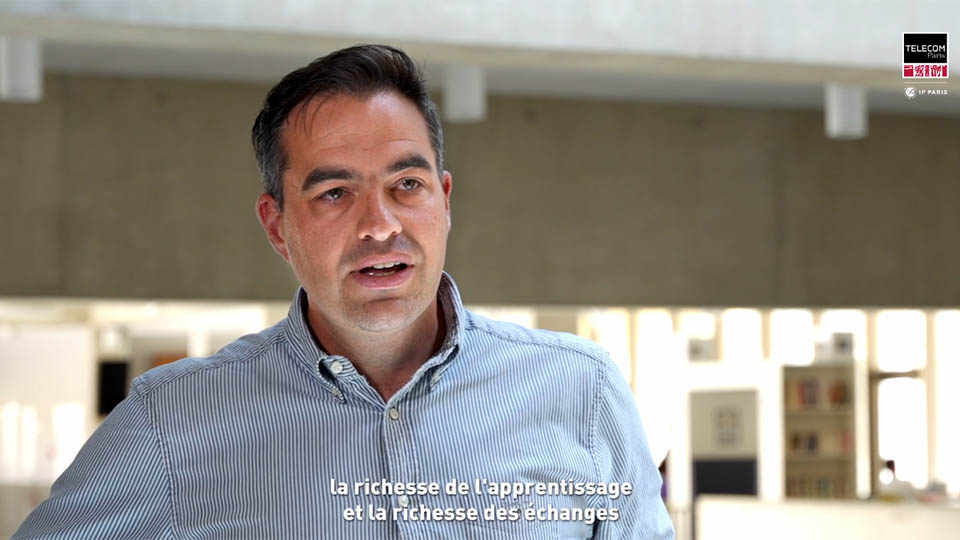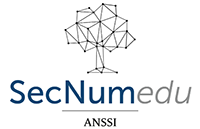Classé n°1 Eduniversal | label SecNumedu de l’ANSSI
Temps plein | 670h | Campus de Saclay, à Palaiseau
Attention : nombre de places limité.
Les leviers de la réussite
- Une formation de haut niveau incluant la gouvernance de la sécurité, la cryptographie, le forensique et l’utilisation de l’IA en cybersécurité
- Une pédagogie d’immersion dans des cas d’usage réels, en partenariat avec des entreprises
- Un corps enseignant équilibré composé de plus de 50% de professionnels
de grandes entreprises connues en cybersécurité telles que :
- Un label de la Conférence des Grandes Écoles
- Une préparation aux certifications ISO27001, CCSP, Ebios Risk Management
 Un accès annuel à Try Hack Me pour plus de pratique en hacking éthique, SOC (centre des opérations de sécurité) et sécurité Cloud
Un accès annuel à Try Hack Me pour plus de pratique en hacking éthique, SOC (centre des opérations de sécurité) et sécurité Cloud
D’après Eduniversal et son classement 2024 des meilleurs Mastères Spécialisés®, le MS ECRSI (ex CARC) est classé 1er dans la catégorie Télécom et réseaux et se place directement en 5e position pour son premier classement en Cybersécurité !
Pour garantir une pédagogie personnalisée, nous gardons des promotions de taille raisonnable, alors n’attendez plus pour candidater !
Un secteur très dynamique
Les attaques cybersécurité des réseaux sont en constante augmentation. Plusieurs analyses des tendances cyber menées par des analystes de l’évolution numérique révèlent que beaucoup d’entreprises ont des vulnérabilités à haut risque dans leurs réseaux. La cybersécurité est devenue un besoin vital des entreprises de toutes tailles et de tous secteurs, et la demande de recrutement en cybersécurité est en evolution.
L’économie, l’industrie et les pouvoirs publics ont besoin de l’expertise cybersécurité réseaux & SI des professionnels formés par Télécom Paris !
Contenu de la formation
Les cours se déroulent sur 2 semestres à temps plein. Un stage de thèse professionnelle de 4 à 6 mois vient compléter cet enseignement académique.
- Un projet fil rouge pour rendre opératoires les acquis et pratiquer le travail en équipe en conditions réelles,
- Une thèse professionnelle soutenue après une période 4 à 6 mois en entreprise pour s’immerger dans des problématiques d’entreprise et le milieu professionnel
- Rappels Réseaux et Systèmes d’information
- La Cryptographie, ses mécanismes et son application: rappel mathématiques, algorithmes de chiffrement, cryptographie sur courbes elliptiques, chiffrement homomorphe, fonctionnel, post-quantique, etc…, les protocoles cryptographique, Le certificat numérique et infrastructure à clé publique (PKI)
- Pilotage et Gouvernance de la sécurité: Système de Management de Sécurité de l’Information (SMSI), Management des risques/ EBIOS Risk Manager (EBIOS RM), Gestion de projet et pilotage de la sécurité opérationnelle, cyberstratégie et la cyberpolitique de l’entreprise, posture d’un manager Cybersécurité
- La Cybersécurité des réseaux et système d’information
Architectures de sécurité, sécurité des réseaux mobiles, Firewalling (utilisation des équipements Stormshield) et détection d’intrusion, sécurité des systèmes d’exploitation, IA pour la Cybersécurité, sécurité Cloud - Forensic et analyse des menaces
Ethical hacking, SOC, Méthodologies d’évaluation de la sécurité, Analyses des logiciels malveillants, CTF : la capture du drapeau - Préparation à des certifications Cyber
Formation ISO 27001 « Sécurité des Systèmes d’Information, Formation CCSP « Certified Cloud Security Professional », EBIOS Risk Management
Destinés à mettre en application les enseignements théoriques de l’École, les sujets proposés dans le cadre du projet Fil Rouge couvrent les besoins réels immédiats ou à venir de la cybersécurité des réseaux et des systèmes informatiques. Exemple de sujet : étude et mise en place d’un SOC, Sécurité pour la mobilité, « LoRaWAN attack in military use case » accepté en DEMO dans CCNC2025.
Elles représentent à la fois un moyen privilégié d’acquisition de connaissances et l’occasion de mettre en pratique, au cours d’un stage au sein d’une entreprise, les méthodes, techniques, outils et approches étudiés pendant la période de cours. Elle offre l’opportunité de confronter l’expérience pratique et la réflexion conceptuelle. Lorsque la problématique de la thèse est liée à un aspect concret, ce qui est souvent le cas, elle doit cependant présenter un niveau théorique suffisant.
Exemples de thèmes soutenus après une période de 4 à 6 mois en entreprise :
• Déploiement d’un réseau sécurisé
• Automatisation de la détection des vulnérabilités des plugins du CMS WordPress
• Mise en place d’accès sécurisé et analyse des risques
• Architecture PKI et TéléTVA
• Sécurité des SI
• Mise en oeuvre de la méthodologie CMMI pour la gestion des retours d’expérience (RETEX) en cyber défense
• Adéquation entre l’environnement de contrôle informatique et la règlementation DORA (digital operational resilience act)
• Cybersécurité des filiales
Témoignages

Georges Derache…

Fabien Romain…
… font partie de la promotion 2024 du Mastère Spécialisé Expert Cybersécurité Réseaux et Systèmes d’Information : ils nous font part de leur expérience, des connaissances acquises, de l’ambiance, du côté pratique et donnent des conseils.
Classements Eduniversal
Notre formation est classée parmi les meilleurs
Masters, MS & MBA Télécoms et Réseaux
de France :
Notre formation est classée parmi les meilleurs
Masters, MS & MBA Cybersécurité, Sécurité des Systèmes et Protection des Données de France :
Tarifs
- Frais de dossier : 90 €
payables en ligne, non remboursables. - Frais de scolarité 2026-2027 :
14.100 € financement personnel (étudiants, demandeurs d’emploi)
18.800 € financement entreprise, administrations, France Travail, autres organismes (Région…)
Acompte de 30% non remboursable (sauf en cas de refus de visa), payable par virement ou par chèque.
Solde payable en 3 échéances sur l’année d’enseignement.
Prix incluant la mise à niveau si nécessaire et l’adhésion au réseau Télécom Paris alumni pendant la scolarité.
Opportunités de carrières
Le Mastère Spécialisé ECRSI de Télécom Paris bénéficie d’une très grande notoriété aussi bien auprès des grands groupes internationaux que des start-up. Les étudiants reçoivent généralement plusieurs propositions de stage ou d’embauche au cours de leur formation.
Des grandes entreprises comme l’Armée de Terre, ANSSI, CEA, IBM, Orange, Bouygues et bien d’autres sont membres des comités de veille et de perfectionnement du Mastère Spécialisé assurant une mise à jour continue des programmes en prise directe avec les besoins en compétences du marché.
Les diplômés du Mastère Spécialisé® (MS) Expert Cybersécurité des Réseaux sont formés pour les métiers de:
- Gestion de la sécurité et pilotage des projets de sécurité
- Conception et maintien d’un SI sécurisé
- Gestion des incidents et des crises de sécurité
- Conseil, services et recherche
Principaux recruteurs : équipementiers de sécurité des réseaux, grandes entreprises, les organismes militaires…
Responsable
Mounira Msahli est une enseignant-chercheuse du département Informatique et réseaux de Télécom Paris, spécialiste des questions de sécurité des réseaux véhiculaire et de l’utilisation de l’IA en cybersécurité. Elle a travaillé dans des projets européens et des projets industriels d’envergure et est l’auteure de plus de 30 publications. Son expérience comprend plus de 1000h de cours sur tout les sujets ayant trait à la cyber et l’encadrement de plusieurs doctorants.








